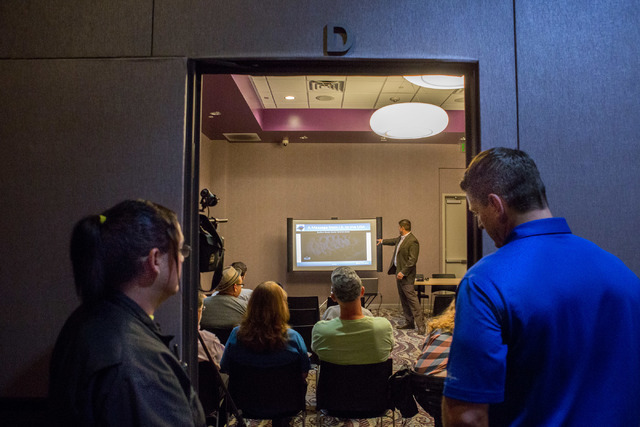Las Vegas police speak with LGBT bar, nightclub employees on ‘signs of terrorism’
About a month after the deadly LGBT nightclub shooting at Pulse in Orlando, a stack of small cards that read “See something say something” sat on the main counter Thursday at the front desk of the Gay and Lesbian Community Center of Southern Nevada in downtown Las Vegas.
The red cards contained contact information for the Southern Nevada Counter-Terrorism Center and listed the “seven signs of terrorism” — the topic of a educational chat with LGBT nightclub owners, employees and community members that Metro hosted Thursday afternoon in light of the Pulse shooting.
Metropolitan Police Department Lt. Sasha Larkin — who works with the department’s office of community engagement — waited in front of a projector screen in a small meeting room at the 401 S. Maryland Parkway building.
“After Orlando, people in the club said, ‘We knew he was weird,’” Larkin said of the shooter who killed 49 people and injured dozens of others. “Our unit tries to get people to listen to their instincts,” and report when something feels “weird” or “off” before an attack happens, she said.
“Human nature knows.”
In the presentation, the “seven signs of terrorism” highlighted how terrorism takes time and planning.
“Most people think that a terrorist looks like this and acts like this and goes to this place and does these certain things, and that’s just the farthest thing from the truth,” said officer Michael Brambila, with Metro’s counter-terrorism unit.
Larkin said nightclubs on the Strip meet regularly to discuss security, but Thursday’s meeting was specifically for LGBT establishments because “they’ll be targeted for different reasons,” she said.
“First off, the Strip is iconic,” Larkin said. And at nightclubs on the Strip, “you have people from all over the world in one small space.”
An LGBT business can still attract large, global crowds, she said, but it also typically will attract regulars from the local community, Larkin said. “An LGBT nightclub will be targeted for who they are, what they represent.”
As the presentation continued, Clair Koetitz and Lyndon Marquez sat in the room, listening.
“We’re on the board for Pride — the parade, the festival. So it’s something we need to be a little bit aware of,” Marquez said. Metro has been helpful with parade security in years past, he said, but the Thursday presentation was enlightening in terms of what to do as an individual when you spot something suspicious.
Aside from calling 311 or 911, employees and owners were asked to call the counter-terrorism line at 702-828-7777 to report suspicious activity or persons.
“Ultimately we need to work together as a community and we need to help each other,” Brambila said.
Contact Rachel Crosby at rcrosby@reviewjournal.com or 702-387-5290. Follow @rachelacrosby on Twitter.
SEVEN SIGNS OF TERRORISM
Surveillance: Someone watching entry and exit points, studying sketches or blueprints of buildings
Information gathering: Someone who's asking "weird" questions about security staffing and capabilities. "Normal people who go to a club or venue don't usually care how many security guards there are," aid officer Michael Brambila, with Metro's counterterrorism unit
Testing security: Attempts to measure reaction times, assess strengths and weaknesses
Acquiring supplies: Purchasing or stealing explosives, weapons and fuel. Brambila said Metro has a good relationship with many local businesses that sell those items, including beauty stores, which sell chemicals that, in large quantities, can be used for explosives
Suspicious persons: People loitering or probing nearby, looking "out of place"
Dry run: Mapping out routes and moving about the venue in preparation for a future attack
Deploying assets: The moments before the actual attack, when perpetrators are setting up and getting into position. Also the "last chance" to alert authorities



















